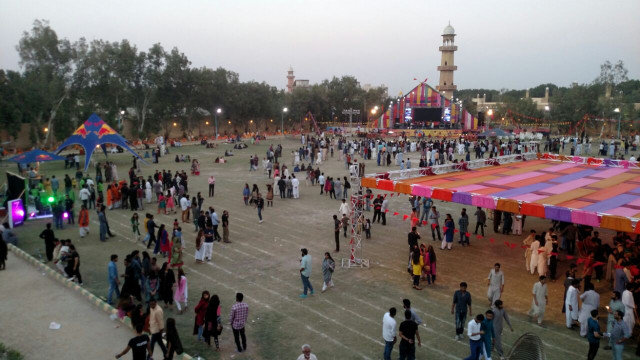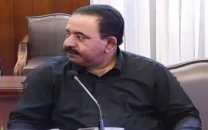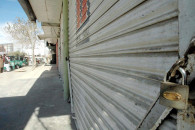Playing for the planet or for Thar?
Lahooti Melo session focuses on Thar Coal Project to the exclusion of all other climate issues

PHOTO: EXPRESS
The world is moving towards solar power but we are now starting to build coal projects, said architect Arif Hasan on the second day of the Lahooti Melo.
Although the session was dubbed 'Playing for the Planet' after the global campaign to raise climate change awareness through concerts, music remained essentially missing from the session. The discussion also argued specifically about the Thar Coal Project, as if implying that the country is confronted with no other climate issues.
"Why should the people of Thar pay the price [by means of environmental degradation] to meet the energy needs of Pakistan?" questioned Prof Dr Arfana Mallah, president of the Sindh University Teachers Association, who moderated the session. Architect Arif Hasan joined the discussion via video conference while Sustainable Development Policy Institute's Mome Saleem, journalists Afia Salam and Suhail Sangi and United National Development Programme's Masood Lohar attended as panelists.
Hasan said countries like the United States, China and India, with the largest coal powered energy base, are quitting this hydrocarbon because of its adverse impact on the environment. Open pit mining will cause air pollution and destroy vegetation and grazing fields for livestock, he added.
 PHOTO: EXPRESS
PHOTO: EXPRESSHe gave reference of the US and China, where he said that only 10% to 12% of trees planted under the coal projects survived, but nine million acres of land turned barren.
"The fact is that our country is drowning in debt and ad hoc policies are foisted on us, which we implement," said Hasan. He bewailed that the country's elite class and policymakers are insensitive towards the poor and their problems.
Salam explained that the choices before Pakistan are either to rely on hydel or coal-based electricity production or to import expensive fuels from other countries. "Our self-sufficiency for power is compromised. Our self-sufficiency for water is compromised [because of shared water with India]."
She said Pakistan has awakened late to harness coal, as the deposits were discovered three to four decades ago when the world was also heavily relying on coal for energy. She contended that though coal is a dirty energy, with the help of technological advancements, emissions from coal plants can be contained.
Hyderabad welcomes back Lahooti Melo with open arms
Saleem supported the idea of meeting electricity needs through renewable energy sources. She believed that the coal project will affect the indigenous people in Thar in the short-term and the whole region, including India, in the long-run. "The environment has no borders."
Sangi complained that the people being displaced in Thar Coal Block II are facing resettlement problems. Lohar, meanwhile, questioned why other projects in various parts of Sindh which contributed to environmental hazards are not being discussed. "Why doesn't the media highlight the coal mining problems in Jhampir [Thatta district] and the brick kilns that are responsible for 30% pollution in Pakistan?" he asked.
He said there are two questions related to the issue around which a consensus should be built. The first was whether the country wanted to harness coal or not, and the second was how to use advanced technologies to reduce emissions and mitigate effects of the project on the local community.
The $2 billion project of the Sindh Engro Coal Mining Company (SECMC) in Block II in Islamkot, which will generate 660 megawatts of electricity, has attained 70% completion. The SECMC claims to provide cheaper power and also open the doors of development in Thar. The coal mine's size will grow to 1.5 square kilometres by the time the plant becomes operational.
Lahooti Melo: When music woke up Hyderabad
According to the company, enrollment in the SECMC's Thar Foundation Schools will increase from 5,000 in 2018 to 22,000 in the next five years. A 250-bed hospital will be constructed at a cost of Rs2.5 billion. So far, the company has employed around 2,500 local people after providing them free training in different skills. The higher education of 25 engineers from the local community is also being financed.



















COMMENTS
Comments are moderated and generally will be posted if they are on-topic and not abusive.
For more information, please see our Comments FAQ